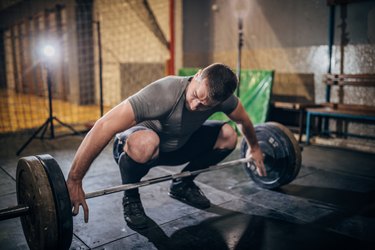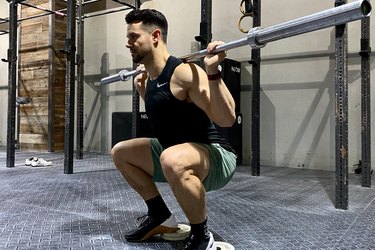
Nothing compares to the ego-boosting high of adding more and more weight to your barbell squat as your sets go by. But while increasing your squat weight is certainly satisfying, no one is immune to an eventual plateau.
If you feel like you've tried all the hacks and variations out there, it's time to give a little-utilized trick a try: elevating your heels.
Video of the Day
Video of the Day
First, Go Back to Squat Basics
To say that squats are essential is an understatement. A fundamental movement pattern, squats are an exercise you're probably doing every day in some capacity or another, whether you're at the gym or just sitting down in a chair, according to the American Council on Exercise.
Squats are a compound exercise, meaning they involve more than just one joint and muscle group. They're a staple leg-day move, but squats take time to master, especially if you want to perform them safely and effectively. Even seasoned lifters can benefit from a quick form check:
How to Do a Squat With Proper Form
- Stand with your hips slightly wider than hip-width apart, toes pointing slightly outward.
- Push your hips back and, keeping your back flat and chest out, bend your knees.
- Lower down toward the ground until your thighs are parallel to the ground.
- Pause for a moment, then press into your heels. Push your hips forward and return to standing.
Now Elevate Your Heels to Improve Your Squats

While there are plenty of squat variations and hacks that will shake up your squats, elevating your heels is one you'll definitely want to try. Raising your heels helps you sit deeper into your squat, which will recruit more muscle fibers and strengthen your quads, says Mathew Forzaglia, certified personal trainer and founder of Forzag Fitness on the NEOU App.
But the benefits don't stop there. Heel elevation is a great corrective exercise for individuals with tight calves, Forzaglia says. Since you're flexing your feet, it takes the stress out of the calves and allows a deeper squat.
A heel raise is even beneficial for total gym newbies, too. "Anyone really can benefit from this [modification]," Forzaglia says. "When someone that doesn't work out comes into the fitness world, they may lack a fair bit of mobility, not allowing them to sit back into a squat correctly. This will help eliminate some issues while we get them to understand a squat and build strength."
The Best Way to Squat With Elevated Heels
No, squatting with elevated heels doesn't mean standing on your tiptoes and keeping your heels mid-air. Some gyms have small ramps or elevated platforms that you can stand on to raise your heels. Or you can set your heels on two 5-pound weight plates, toes on the ground.
Olympic lifting shoes are another option, Forzaglia says. These shoes function much like a wedge heel, with a higher platform in the back. Reebok, NOBULL and Nike all offer lifting shoes worth trying out.
When it comes to form, squatting with raised heels is much like a standard squat. But you'll want to avoid driving your knees further forward. Forzaglia recommends really focusing on sitting back and down, while maintaining an upright torso.
Although this little hack will help you gain strength, you don't want to use it every time you squat. Instead, consider it a tool to help you work on mobility and improve your squat. "Don't become reliant on it unless it's part of your sport, in this case, Olympic weight-lifting," Forzaglia says.
Was this article helpful?
150 Characters Max
0/150
Thank you for sharing!
Thank you for your feedback!